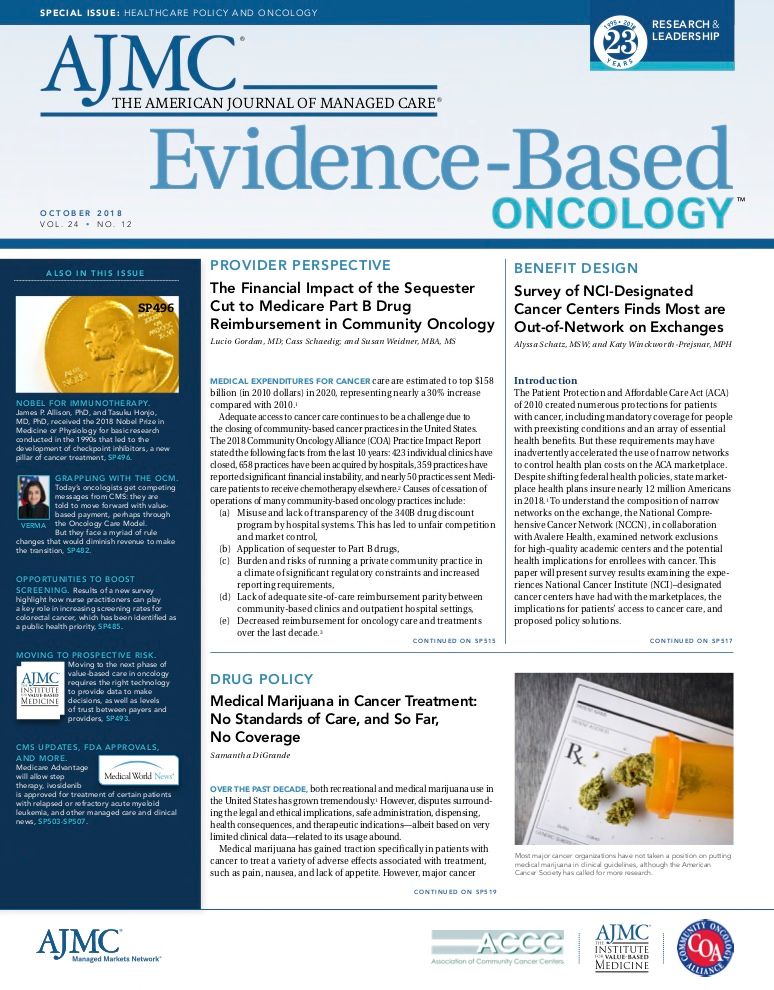- Center on Health Equity & Access
- Clinical
- Health Care Cost
- Health Care Delivery
- Insurance
- Policy
- Technology
- Value-Based Care
From the Editor-In-Chief: Getting to The Prestige in Cancer Care
“Every great magic trick consists of three parts or acts. The first part is called ‘The Pledge.’ The magician shows you something ordinary. ...The second act is called ‘The Turn.’ The magician takes the ordinary something and makes it do something extraordinary. Now you’re looking for the secret, but you won’t find it, because of course you’re not really looking...Every magic trick has a third act, the hardest part, the part we call ‘The Prestige.’” — Christopher Priest, The Prestige
I would be loath to equate the domain of cancer care delivery and reimbursement with the fascinating world of magic, but the analogy is not so bizarre as it might first appear. We have gone through an extraordinary period of change in oncology; during this time, standards of care in cancer have been upended by unprecedented innovations in diagnosis and treatment that have changed much of what we know about the care of many patients. Patients with metastatic melanoma and advanced stage non—small cell lung cancer now enjoy a breadth of previously unimaginable effective treatment options that have transformed the meaning of those diagnoses. We now bear witness to countless survival stories from patients who show us how historical outcomes have yielded to truly extraordinary advancements in care. The Washington Post recently featured a story on former President Jimmy Carter whose life and tirelessness, despite a diagnosis of metastatic melanoma, is a graphic example of the human impact of emerging therapeutic advances.1 The challenge now is that of getting to The Prestige portion of this profound paradigm shift. It means creating systems of care and crafting healthcare policy that will support these advances becoming equitably, routinely, and economically sustainably available to those in need.
We are in a time of strange paradoxes, when life-saving therapeutics are available but inaccessible to patients in need.2 Inasmuch as scientific innovation in oncology has led to previously unimaginable advances in cancer therapeutics, our health policy, reimbursement models, and conceptual constructs of value have not kept up with these advances. This failure of our cancer care delivery system to evolve at the same breakneck pace as our diagnostic and therapeutic armamentarium is creating deep disconnects in patient access, sustainable reimbursement, and the quest by government and private payers to move toward value-based pay for performance.3,4 I do not believe that we will come to a reso- lution with any of these issues quickly or easily. To accomplish these goals, healthcare payers, government, patients, health systems, and oncology practitioners need to commit innovative ideas, talent, resources, comprehensive clinical data sets, and a willingness to partner closely to create a deeper and profoundly more transparent understanding of clinical risk, therapeutic opportunity, care effectiveness, and economic sustainability around care delivery than we have ever seen. It means a rejection of zero-sum thinking when it comes to the economics of healthcare reimbursement. It means refocusing on the ideal of patient centricity in care delivery and therapeutic outcomes.
This grand process begins slowly, sometimes in relatively prosaic ideas and models. And so we begin down this road in this issue of Evidence-BasedOncologyTM with a series of conversations on the ways in which healthcare policy might evolve. Lucio Gordan, MD, and co-authors on behalf of the Community Oncology Alliance evaluate the impact of sequester cuts upon reimbursement for chemotherapeutic drug administration in the community setting. Alyssa Schatz from the National Comprehensive Cancer Network provides an organizational perspective on the impact of narrow networks upon cancer care delivery. We also feature an overview of how a series of proposals from CMS will affect oncologists in their daily practice, the most recent being whether reimbursement for chimeric antigen receptor T cells should reflect patient-reported outcomes.
As our increasingly effective suite of anticancer therapeutics evolves further, I hope that conversations such as these and a meeting of the minds between the respective cancer care stakeholders can eventually lead to the creation of a comprehensive system of care delivery that ensures that patients get sustainable, equitable access to the care that they need when they need it. This third act in the evolution of our care delivery system is inevitably the hardest part. This is why they call it The Prestige.
REFERENCES:
- Sullivan K, Jordan M. The un-celebrity president. The Washington Post. August 17, 2018. washingtonpost.com/news/national/wp/2018/08/17/ feature/the-un-celebrity-president-jimmy-carter-shuns-riches-lives- modestly-in-his-georgia-hometown/?utm_term=.b26b02b7209c. Accessed September 20, 2018.
- Emmanuel Z. We can’t afford the drugs that could cure cancer. The Wall Street Journal. September 21, 2018. wsj.com/articles/we-cant-afford-the- drugs-that-could-cure-cancer-1537457740. Accessed September 20, 2018.
- FY 2019 IPPS final rule homepage. CMS website. cms.gov/Medicare/Medicare- Fee-for-Service-Payment/AcuteInpatientPPS/FY2019-IPPS-Final-Rule-Home- Page.html. Updated August 2, 2018. Accessed September 20, 2018.
- Goldman DP, Lakdawalla DN, Newcomer L. It’s time for value-based payment in oncology. Health Affairs Blog website. healthaffairs.org/do/10.1377/hblog 20150428.047344/full/. Published April 28, 2015. Accessed September 20, 2018.

Telehealth Intervention by Pharmacists Collaboratively Enhances Hypertension Management and Outcomes
January 7th 2026Patient interaction and enhanced support with clinical pharmacists significantly improved pass rates for a measure of controlling blood pressure compared with usual care.
Read More
Exploring Racial, Ethnic Disparities in Cancer Care Prior Authorization Decisions
October 24th 2024On this episode of Managed Care Cast, we're talking with the author of a study published in the October 2024 issue of The American Journal of Managed Care® that explored prior authorization decisions in cancer care by race and ethnicity for commercially insured patients.
Listen

